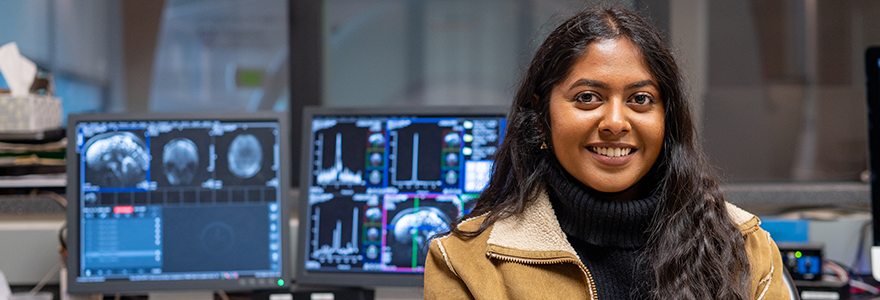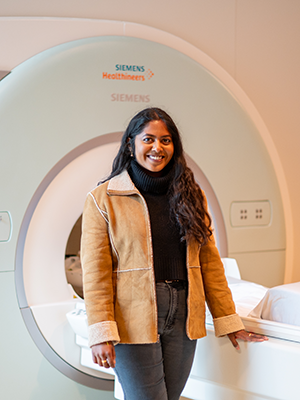PhD candidate confronts schizophrenia and mental health head on

By Iyanuoluwa Soyinka
Mental health can be a deeply personal and challenging topic, but Schulich School of Medicine & Dentistry PhD candidate Kesavi Kanagasabai wants to confront mental health head-on.
Kanagasabai has introduced a new campus program that creates space for students to talk about their mental health struggles. And, it’s why she’s also creating a tool to improve research on a particularly detrimental illness: Schizophrenia.
Tremendous progress has been made in the treatment of schizophrenia over time. Although there is no known cure for the condition that causes hallucinations and delusions, there are several forms of treatment, including medication and therapy.
Still, much about the illness remains unknown. Several theories suggest that the imbalance of neurochemicals in the brain results in symptoms, such as difficulty interpreting social cues and apathy.
“My goal is to build tools that will better assist researchers to assess these illnesses and work towards a cure for psychiatric and neurocognitive disorders,” she said. “This technique allows for accurate measurements of the potential neurochemical imbalances that may be contributing towards the pathophysiology of schizophrenia.”
But it is difficult to pinpoint where things go wrong.
“This tool will simplify the process,” said Kanagasabai. “With this innovation, researchers can study and provide accurate data about the relationships between the neurochemicals of interest and the observed symptoms.”
 Kesavi Kanagasabai
Kesavi Kanagasabai
Destigmatizing mental health is still a work in progress
Raised in Scarborough, Ont., Kanagasabai moved to London in 2015 to take the Bachelor of Medical Science program at Schulich Medicine & Dentistry. She started in the Master of Science program in 2020 and shifted to pursue her PhD two years later. Kanagasabai was also the recipient of this year’s Norman E. Nixon Marie Rämö Nixon Award, awarded to a graduate student working with a Robarts Research Institute scientist.
Growing up in a South Asian household, Kanagasabai was aware of a massive stigma around mental health among many in her community, as well as the general public. Removing the stigma of mental health is a work in progress for many in Canada, she said. Although there is more public awareness about the importance of mental health than in the past, many still disregard mental health care and there are negative stereotypes around mental illnesses.
“Mental health-related symptoms are often coined with bad habits or irresponsibility rather than a coping mechanism to function,” said Kanagasabai.
Everyone should have access to counselling and resources
While mental health resources are more accessible than ever, there are often financial barriers to counselling and resources. Kanagasabai wants everyone to be able to access mental health help. In September 2023, she introduced a free mental health counselling program called I.M. Well, available to graduate students at Western University.
Kanagasabai is devoted to the project and its potential to help students while keeping a strong focus on the research she hopes will help people affected by schizophrenia.
“She is working to understand what is the illness process, where are the roots, and the mechanism behind it,” said Lena Palaniyappan, one of Kanagasabai’s supervisors who is an adjunct professor in the Departments of Psychiatry and Medical Biophysics. “If we understand the molecular and chemical level of these problems, then we can devise new treatments or personalize existing treatments that really go and attack the prime causal elements for these conditions.”
With Kanagasabai’s work, researchers could provide the general public with more information about this illness in the future, and reduce the stigma surrounding mental illness.
I.M. Well is a virtual health suite where students can access counselling, legal, financial, nutritional, life and health counselling. The program provides students with mental health counselling in more than 180 languages and allows students on the enhanced plan to seek therapy with no added cost. This resource can be accessed at SOGS Student VI.









